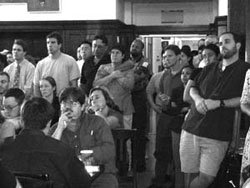TC Responds to Tragedy
On Thursday, September 13th, the silence of New York City in the wake of the most deadly terrorist attack in history was deafening. Cellular phones weren't ringing. The streets were almost empty. Everyone was quiet.
Everyone except the TC Community. Three hundred students, faculty and staff gathered in the Cafeteria to share breakfast, sadness and, above all, hope.
As people settled in their chairs, TC President Arthur Levine got everyone's attention. But, it wasn't too difficult. No one was as boisterous as usual and laughter was absent. After his remarks, Levine asked for a moment of silence for the victims of this tragedy.
Interim Dean Ruth Vinz spoke of the people who were downtown in makeshift counseling centers, in schools to offer comfort, and volunteers digging in the rubble.
"Death is a small noun and carries much weight," she said.
"This is the kind of morning-candid sunlight elucidating the air-that makes me want to begin this past Tuesday morning again so that each person who lost acquaintances and loved ones, so that each person who mourned for the stranger as well as those who made known through their small acts of generosity-so that each person could go back to Tuesday morning and start over," said Vinz. "But it cannot be."
"Is there a more gentle way to go on?" she asked. "How will we as a community committed to education help write the future?" When Frances Schoonmaker, Associate Professor of Education, came to the podium, she acknowledged those who felt "helpless and peripheral." She reminded everyone that they "represent the life of New York and the life of a community."
She invited everyone to say peoples' names out loud who were involved in the tragedy. After names were called out from all over the room, Schoonmaker opened up the microphone to the community.
Drawing from his experience as a hostage in Iran in 1979, Barry Rosen, Executive Director of External Affairs at TC, was the first to speak. He said that terrorists try to diminish humanity in a tragic event. He learned as a hostage that we don't think of each other enough. It was his colleagues that kept him going and kept him intact.
"We will survive this crisis in time," said Rosen, "but when we pass people we should think about that person and when we say hello and good bye to people you should really mean it-because life is so fragile."
During this time many reached out to family members and friends for help. International students who can't be close to their families at this time are particularly vulnerable. Since many people in the TC community come from other countries, Marion Boultbee, Coordinator of Student Life, urged the TC community to help end the personal harassment and attacks on people of other cultures.
"As an institution that supports international education, we must be active in ending this behavior-it is not acceptable," Boultbee said. "We must reach out to the international students and provide them with the support they need in this difficult time because they are so far away from their families."
A student from the Department of Counseling and Clinical Psychology, Julie Arseneau, took the podium to express her feelings of helplessness during the tragedy. She wants to link up with others who are in pain and talk about what all this means.
"I'm alive, but I have no medical training to offer, no money to donate, no equipment to give, but despite this, I am profoundly and forever changed," said Arseneau.
TC is offering help in this time of need. As an expert on coping with grief, George Bonanno, Assistant Professor of Psychology and Education used a quote from Martin Luther King, Jr. to illustrate how the TC Community, New York and the world must come together and use love to drive out hate.
Later on that day, Bonanno, Barry Farber Professor of Psychology and Education and Dinelia Rosa, Director of Psychology Consultation Center offered a program for students in the Clinical Psychology Program to discuss how they can best serve the city. In that program, counseling psychology students were given ideas and suggested their own ways on how they can help the community both formally and informally. Many students shared stories of trying to volunteer, but were turned away.
Rosa said that the services of the center are "wide open to the community at large to provide any service we can do such as grief and crisis intervention."
TC Student and staff member Laurie Behrman shared a personal story with the audience. She reminded everyone to be gentle with each other and gentle with themselves because everyone grieves differently.
After everyone had spoken, Schoonmaker noted that it gave her hope to see how New York is responding.
Before closing the meeting with a moment of silence, she said that people are working hard at the site right now and that is one of the acts of goodness in this horrible set of events.
Published Monday, May. 20, 2002
